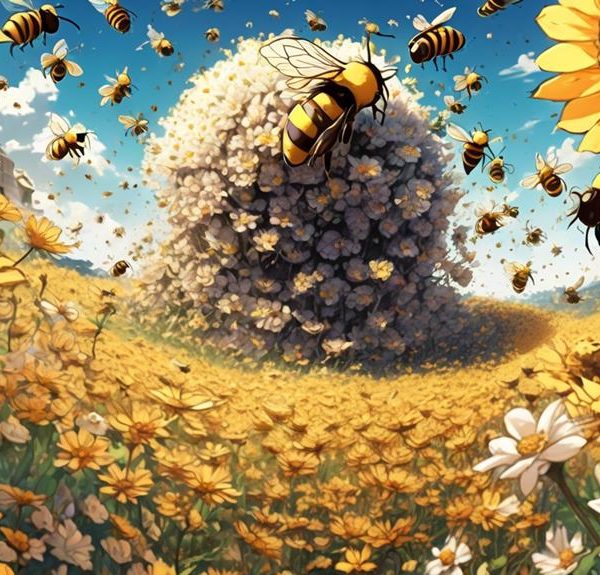Is beeswax in your honey safe to eat? Uncover the truth about its nutritional value, potential health concerns, and its impact on taste and texture.
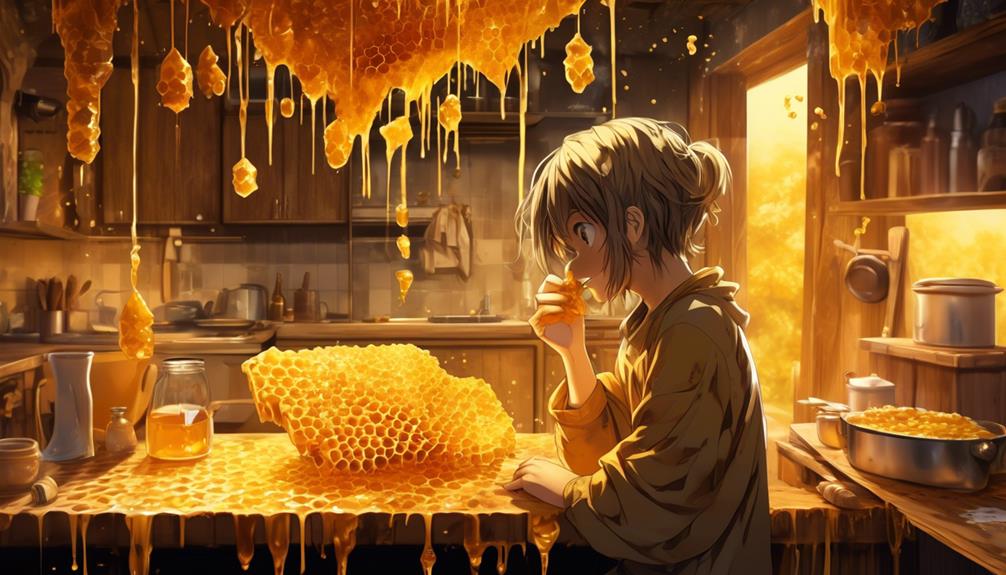
Is It Ok to Eat Beeswax With Honey?
Navigating the world of natural foods can often feel like walking through a dense, uncharted jungle. You've stumbled upon beeswax in your jar of honey and you're wondering if it's ok to eat it or if you should take the time to separate it out.
There's a lot to consider, from the nutritional components of the beeswax to any potential health concerns. Not to mention, there are varying opinions on whether the taste and texture add to or detract from the overall honey experience.
So let's embark on this journey together, and see if we can't shed some light on your beeswax dilemma.
Key Takeaways
- Beeswax is a natural product made by honeybees and is mainly composed of fatty acids and alcohols.
- Beeswax has limited nutritional benefits due to its low amounts in the wax and inefficient digestion.
- Beeswax can be found in raw, unfiltered honey and is safe to consume, adding flavor and texture.
- Consuming beeswax may have potential health benefits such as improving digestive health, supporting the immune system, and aiding in skin health and wound healing.
Understanding Beeswax
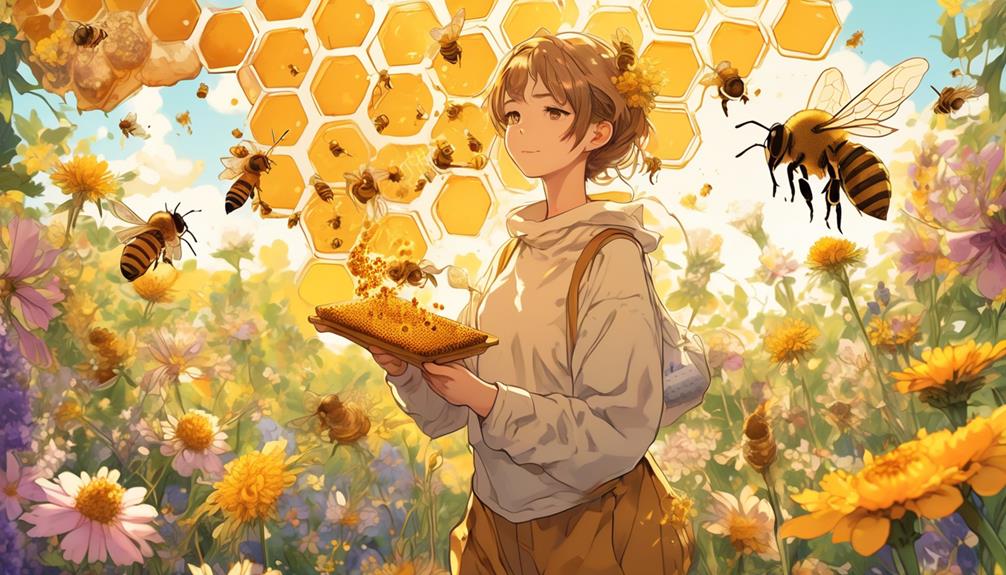
Before you delve into the practice of eating beeswax with honey, it's essential to understand what beeswax is and its potential impacts on health.
Beeswax is a natural product made by honeybees. They secrete it through glands on their abdomen and then use it to build the hexagonal cells of their honeycomb.
While people usually discard the wax when extracting honey, some choose to eat it for its potential health benefits. However, the nutritional profile of beeswax isn't as rich as you might think. It's mainly composed of fatty acids and alcohols, with little to no vitamins or minerals.
There's limited research on the direct health effects of consuming beeswax. A few studies suggest it may have anti-inflammatory and antimicrobial properties, but these are primarily based on animal or lab tests. Additionally, it's important to note that beeswax is considered safe to eat, but only in small amounts. Consuming too much could lead to digestive issues due to its high-fat content.
Therefore, it's crucial to approach the idea of eating beeswax with a balanced perspective, considering both the potential benefits and drawbacks.
Nutritional Components of Beeswax
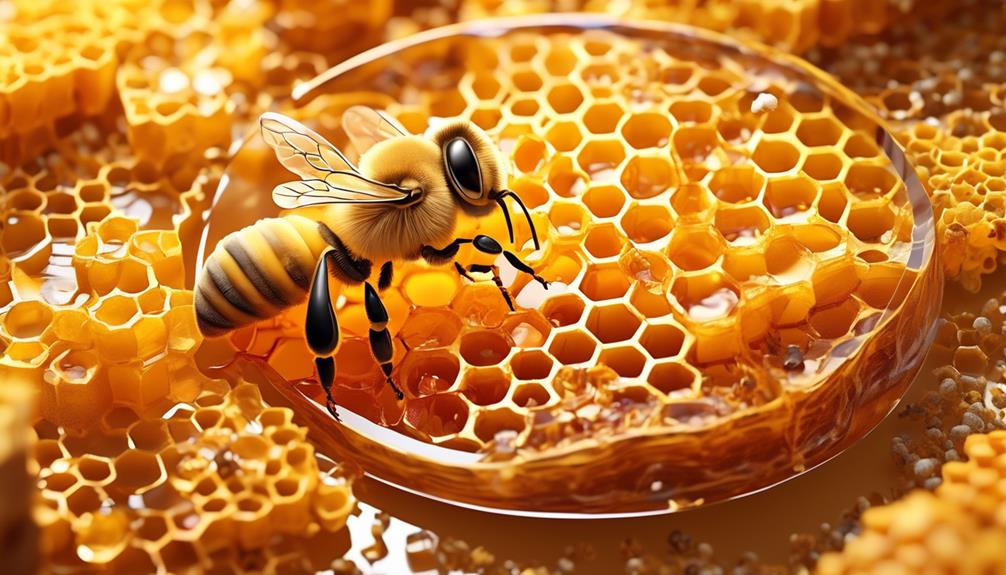
Despite its lack of vitamins and minerals, beeswax does contain some nutritional components worth considering. It's rich in compounds like fatty acids, alcohols, and esters, which are crucial to various bodily functions, including cellular health and energy production.
Nutritional Component | Function | Found in Beeswax |
|---|---|---|
Fatty Acids | Energy production, cellular health | Yes |
Alcohols | Metabolic processes | Yes |
Esters | Various biological reactions | Yes |
But bear in mind, while these components are present, they exist in relatively small amounts. So, don't count on beeswax as your primary source of these nutrients. It's also important to note that the human body doesn't digest beeswax very efficiently, so the nutritional benefits may be minimal.
However, there's more to consider than nutrition alone. Beeswax has been used for centuries in traditional medicine, for its potential anti-inflammatory and antibacterial properties. While scientific research is limited, it suggests possible benefits for skin health and wound healing. So, while beeswax might not be a nutritional powerhouse, it could still be beneficial in other ways.
Beeswax in the Honey Jar
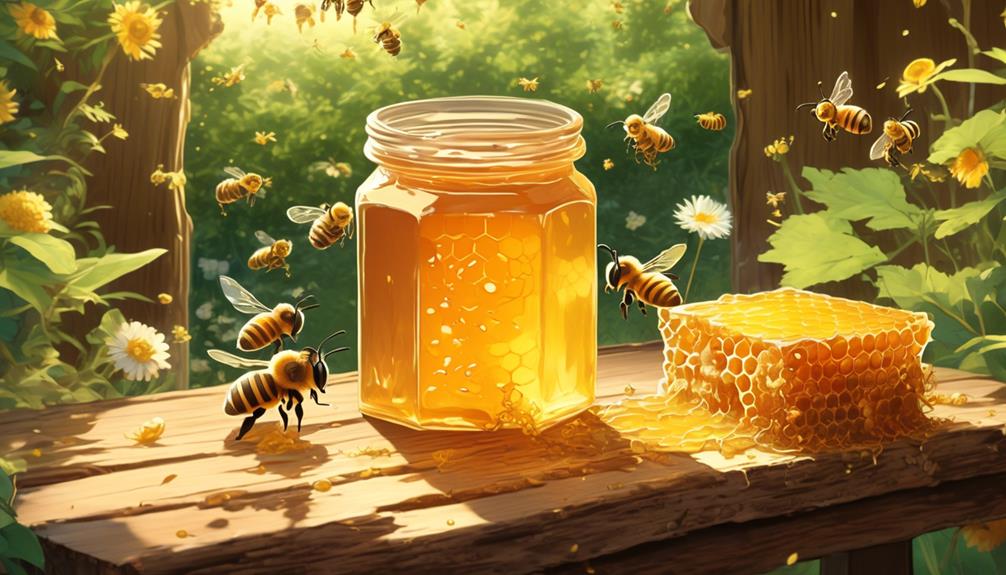
Let's dive into the topic of beeswax in the honey jar, exploring its presence, purpose, and potential benefits in your honey consumption.
You might've noticed pieces of beeswax floating in your jar of honey, especially when you purchase raw, unfiltered honey. This is because bees use this natural substance to build the hexagonal cells in their hives where they store honey.
Having beeswax in your honey isn't a cause for concern. In fact, it's quite the opposite. Beeswax is edible and safe to consume. It's even believed to have several health benefits such as promoting liver health and reducing cholesterol levels, although more research is needed to confirm these claims.
Furthermore, beeswax can enhance the overall experience of consuming honey. It adds a subtle, sweet flavor and a somewhat creamy texture to the honey, enhancing its natural goodness. It's also a sign of the honey's authenticity, indicating that it hasn't undergone excessive processing.
Health Benefits of Eating Beeswax

Building on the mention of its potential health benefits, let's explore in detail how consuming beeswax can contribute positively to your well-being.
Beeswax is a natural product that bees produce and contains a multitude of compounds, including fatty acids and esters. These substances have been linked to a wide range of health benefits.
Firstly, beeswax can help improve your digestive health. It contains a type of alcohol known as ceryl alcohol that can help fight against harmful intestinal bacteria. Furthermore, beeswax is a source of Vitamin A, which is essential for the maintenance of a healthy immune system.
Secondly, consuming beeswax may offer benefits for your skin. It's known for its moisturizing properties, which can keep your skin hydrated and healthy. Some research even suggests that it can have anti-inflammatory and antibacterial properties, potentially helping to reduce skin irritation and promote wound healing.
Lastly, while more research is needed, some studies suggest that beeswax might have potential anti-cancer properties. Its long-chain alcohols and esters have shown anti-proliferative effects in lab studies.
Potential Risks of Consuming Beeswax
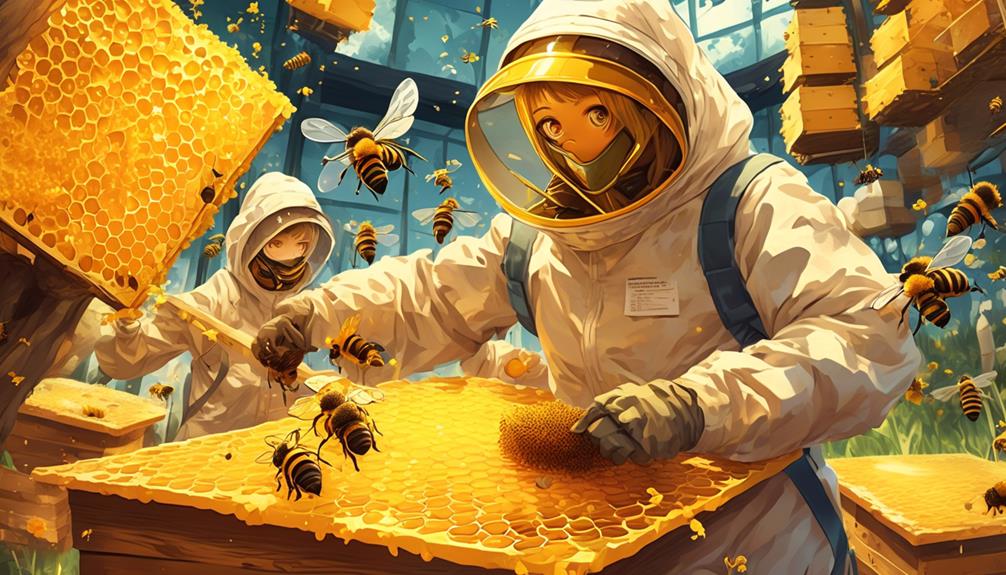
While beeswax offers several potential health benefits, it's also important to consider the potential risks associated with its consumption. Beeswax is generally safe for most people when used appropriately. However, some individuals may experience allergic reactions.
Risk Factor | Description | Precaution |
|---|---|---|
Allergic Reactions | Some people may have allergies to beeswax or related products. Symptoms may include skin rashes, difficulty breathing, or swelling. | If you're aware of a bee product allergy, avoid consuming beeswax. |
Digestive Issues | Beeswax is non-digestible. Consuming it in large amounts may lead to intestinal blockages. | Limit your intake and monitor any changes in bowel movements. |
Pesticide Contamination | Beeswax can contain residues from pesticides used in beekeeping. Long-term exposure may pose health risks. | Purchase from trusted sources that use organic beekeeping methods. |
Personal Experiences and Expert Opinions
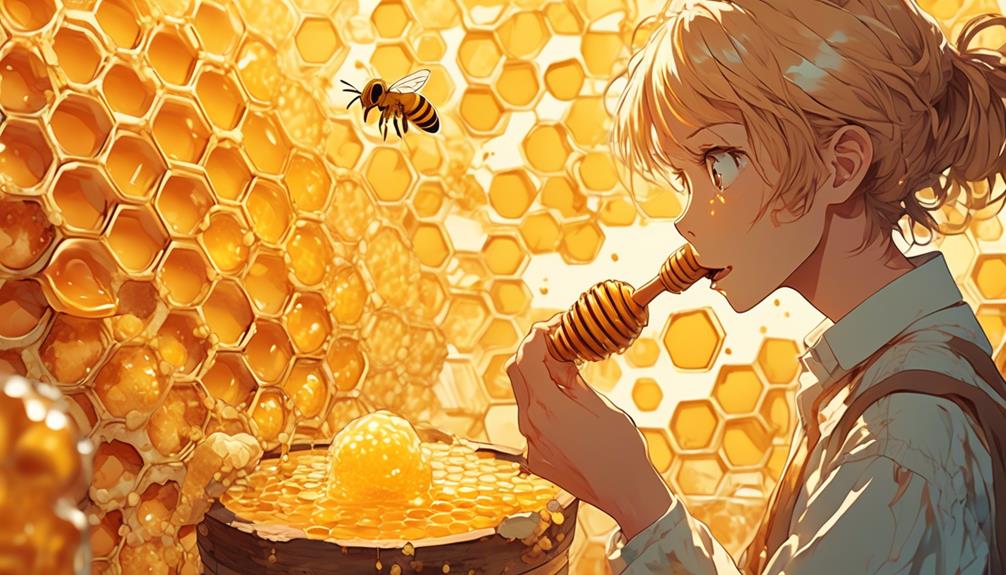
Over time, many individuals and experts have shared their experiences and insights about the consumption of beeswax with honey, shedding light on its benefits and potential drawbacks. You'll find a myriad of testimonials claiming enhanced digestion and energy levels. Some even believe it boosts the immune system, attributing their fewer colds and flus to the regular consumption of this natural product.
However, experts hold mixed opinions. Nutritionists often highlight the rich micronutrients in honey, but caution about the lack of substantial research on beeswax ingestion. While it's generally recognized as safe, some health professionals warn about potential allergies or digestive discomfort, especially if consumed in large quantities.
Beekeepers and honey enthusiasts, on the other hand, generally vouch for its safety and health benefits. They often emphasize the natural and unprocessed aspect of beeswax and argue that it contributes to the overall nutritional value of honey.
Frequently Asked Questions
How Does the Consumption of Beeswax Affect People With Specific Dietary Restrictions or Allergies?
If you have dietary restrictions or allergies, consuming beeswax might affect you differently. It's generally considered safe, but individuals with pollen allergies could react negatively.
It's always best to consult your doctor before introducing new food elements, especially if you have known allergies. Remember, everyone's body responds differently, so what's harmless for one person might not be for you.
Always prioritize your health and take precautions when it comes to your diet.
Are There Any Culturally Significant Uses of Beeswax in Food Across Different Societies?
Yes, there are several cultures that utilize beeswax in their cuisine.
For instance, Ethiopians often include beeswax in a traditional honey wine called 'Tej'.
Likewise, in Greek cuisine, beeswax is used to make 'Pasteli', a honey and sesame seed bar.
It's also used in other societies for food preservation.
However, it's important you're aware of any allergies or dietary restrictions before consuming beeswax.
How Does the Flavor of Honey Change When Consumed With Beeswax?
When you eat honey with beeswax, you'll notice a richer, more complex flavor profile. Beeswax has a subtle, earthy taste that complements the sweetness of the honey, adding depth and texture.
It also enhances the aromatic properties of the honey, making your experience more sensorial. Remember, it's not just about the taste, but the overall sensory adventure.
Can Beeswax Be Used as a Substitute for Other Ingredients in Cooking or Baking?
Absolutely, you can use beeswax as a substitute in cooking or baking. It's often used in place of fats in certain recipes, providing a unique texture. However, it doesn't melt until it reaches about 145 degrees Fahrenheit, so you'll need to consider this when incorporating it.
Also, its flavor is subtle, so it won't overshadow other ingredients. Just remember, it's best to use pure, untreated beeswax to ensure you're not consuming any harmful additives.
Is There a Significant Environmental Impact Related to the Collection of Beeswax for Consumption?
Yes, there's an environmental impact linked to beeswax collection.
You see, bees use a lot of energy to produce wax, which can lead to colony stress if too much is harvested.
It's also crucial to ensure sustainable beekeeping practices are followed. Overharvesting can harm bee populations, disrupt pollination, and ultimately affect food production.
It's essential to consider these environmental impacts before deciding to consume beeswax.
Conclusion
So, you're pondering if it's alright to eat beeswax with honey? Well, it's not harmful per se. Beeswax has its own nutritional components and potential health benefits. However, consuming it in large amounts may not be advisable due to potential risks.
Experts and personal experiences suggest it's fine in moderation. As with any food, it's best to listen to your body and consult a health professional if you're unsure.


